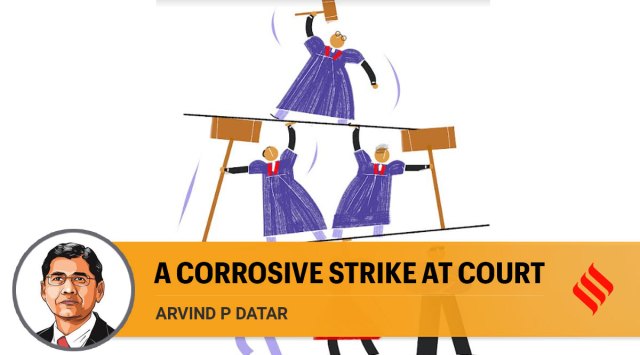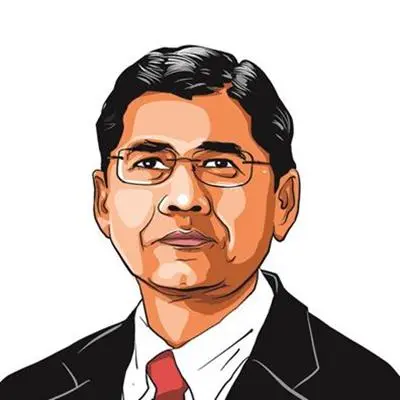Collegium system is better than the NJAC
Arvind P Datar writes: Why the repeated attacks by government on collegium are misplaced and disturbing
 Article 93 of the Constitution says that the Lok Sabha should choose two members of the House as Speaker and Deputy Speaker as soon as the case may be. (Illustration by C R Sasikumar)
Article 93 of the Constitution says that the Lok Sabha should choose two members of the House as Speaker and Deputy Speaker as soon as the case may be. (Illustration by C R Sasikumar) The recent attacks on the collegium system and the Supreme Court are disconcerting as they come from the Law Minister and the Vice-President. The collegium system has been criticised in the past and so has the Supreme Court for having struck down the 99th constitutional amendment that created the National Judicial Appointments Commission (NJAC) and was voted almost unanimously in both Houses of Parliament.
But very few critics understand that the constitutional amendment and the NJAC Act, 2014 was so badly drafted that the NJAC would have collapsed under its own contradictions. All the counsels who argued against the amendment, including Fali Nariman, the late Anil Divan, the late Ram Jethmalani and this writer, had repeatedly informed the Supreme Court that they had no objection to the NJAC replacing the collegium provided judges, sitting or retired, were in a clear majority in the Commission. But the Union of India refused to relent and the 99th amendment was eventually struck down as being violative of the basic structure.
A simple analysis of the appointment process shows that it was unworkable. Under Article 124A, the NJAC oddly had an even number of six members but the Chairperson, the Chief Justice of India, had no casting vote. What would happen if there was a tie and, therefore, a deadlock? No answer.
The Chief Justice and the next two senior judges represented the judiciary. The Law Minister and two “eminent persons” were the other three. One of the eminent members had to be nominated from persons belonging to the Scheduled Castes, Scheduled Tribes, Other Backward Classes or should be a woman. In as many as 67 Central Acts, the “eminent persons” who have to be appointed as part of a committee or a commission, must have expertise in the subject that the statute covers. For example, under the Biological Diversity Act, 2002, a member of the Biodiversity Authority had to be eminent in the field of “conservation and sustainable use of biological diversity”. And a member of the Academic Committee under the National Law School University of India Act, 1986 had to be eminent in law.
Strangely, to select Supreme Court or high court judges, the eminent person needed no connection with the law. In fact, during the arguments, the response of the Union of India was categorical: The eminent members need have no knowledge of law or the functioning of the courts. It was stated that even M S Swaminathan, the renowned agricultural scientist, could be a member. Thus, one-third of the NJAC could be constitutionally and blissfully unaware of the functioning of the Supreme Court or the high courts and yet decide the destiny of our higher judiciary.
The NJAC Act, 2014, which prescribed the procedure for appointment and transfer of judges, was riddled with contradictions and absurdities. Section 5(1) required the NJAC to recommend the senior-most judge of the Supreme Court as the Chief Justice of India “if he is considered fit to hold the office”. Neither the 99th Amendment nor the NJAC Act had any prescribed criteria of what constituted fitness to hold office. On what ground could the senior-most judge become “unfit”? No answer.
A shocking provision was the veto power: No recommendation could be made by the NJAC if any two of the six members disagreed. There could not be a more blatant method of frustrating the appointment process and enabling the executive to completely dominate the judiciary.
The selection procedure for the high court judges was even more bizarre. The Chief Justice and two senior-most judges of every high court had to nominate persons to the NJAC for appointment as high court judges. Simultaneously, the NJAC could also nominate persons for appointment as high court Judges. What would happen if the two sets of nominees were different? No answer. Further, the NJAC had to “elicit in writing” the views of the Governor and the Chief Minister. What would happen if the two took opposite views? Whose view would prevail? No answer.
And now comes the worst blow. The NJAC had the power to frame regulations laying down the criteria of suitability, and the procedure of appointing judges of the Supreme Court and the High Courts. These regulations had to be tabled before both Houses of Parliament. Under section 13, Parliament had the power to nullify these regulations or modify them. This single fatal section made a complete mockery of the appointment process. The present collegium system, despite its drawbacks, is a far better method of selecting Supreme Court and High Court judges.
Most politicians, while in power, are allergic and intolerant to an independent judiciary. It requires a politician to rise to the level of a statesman and a visionary to understand how vital an independent judiciary is to the functioning of a constitutional democracy. Democracy does not end with free and fair elections. Of equal importance are robust and independent institutions that create the necessary checks and balances. The repeated and orchestrated attacks on the collegium and the judiciary will, to borrow the words of Justice Douglas, “set in motion a subversive influence of our own design that destroys us from within.”
The writer practices in the Supreme Court and had appeared in the NJAC case








































